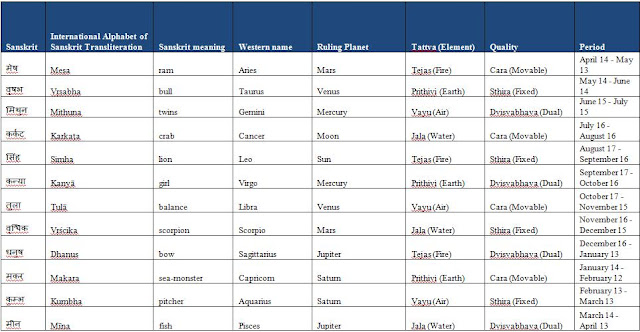Western astrology
looks at the ten major planets as well as the planetoid Chiron and asteroids
such as Ceres, Juno and Vesta.
Vedic astrology only looks at the 7 'original' planets (those that can be viewed with the naked eye) and Uranus, Pluto and Neptune don`t exist here which is a shame really as you can more often than not tell when someone has Uranus, Neptun or Pluto in, for example, the 1st or even 7th house and their transits are one of the most life-changing alongside Saturn's.
Before these three planets where discovered, Western Astrology also used the traditional rulerships. Vedic astrology still uses these today:
The two lunar nodes Rahu (the North Node) and Ketu (the South Node) play a big part in Indian astrology and more often than not are also used in Western astrology. However, how they are viewed is fundamentally different – perhaps due to cultural differences and belief systems. More on this soon!
Both the systems of astrology considers planet to be strongest when in their own sign, or in the sign of exaltation. And a planet is considered to be combust when it is positioned within 6 degrees of Sun. A planet is considered weak when in sign of Debilitation or "fall". However, whereas in Western astrology, a planet is weaker when it is retrograde in the sense that it can’t display all of its strength and the person might find it more difficult to progress, move forward etc., this is not so in vedic astrology. Here, planets are much brighter when retrograding, planets with retrograde motion are considered to be powerful. A debilitated, retrograde planet is even considered to be displaying the same characteristics as though it was exalted.
Here is a useful overview of astrological signs in Western and Indian astrology with time periods, elements and ruling planets.
Vedic astrology only looks at the 7 'original' planets (those that can be viewed with the naked eye) and Uranus, Pluto and Neptune don`t exist here which is a shame really as you can more often than not tell when someone has Uranus, Neptun or Pluto in, for example, the 1st or even 7th house and their transits are one of the most life-changing alongside Saturn's.
Before these three planets where discovered, Western Astrology also used the traditional rulerships. Vedic astrology still uses these today:
·
Mars
rules both Aries and Scorpio
·
Jupiter
rules both, Sagittarius and Pisces
·
Saturn
rules both, Aquarius and Capricorn
The two lunar nodes Rahu (the North Node) and Ketu (the South Node) play a big part in Indian astrology and more often than not are also used in Western astrology. However, how they are viewed is fundamentally different – perhaps due to cultural differences and belief systems. More on this soon!
Both the systems of astrology considers planet to be strongest when in their own sign, or in the sign of exaltation. And a planet is considered to be combust when it is positioned within 6 degrees of Sun. A planet is considered weak when in sign of Debilitation or "fall". However, whereas in Western astrology, a planet is weaker when it is retrograde in the sense that it can’t display all of its strength and the person might find it more difficult to progress, move forward etc., this is not so in vedic astrology. Here, planets are much brighter when retrograding, planets with retrograde motion are considered to be powerful. A debilitated, retrograde planet is even considered to be displaying the same characteristics as though it was exalted.
Here is a useful overview of astrological signs in Western and Indian astrology with time periods, elements and ruling planets.



No comments:
Post a Comment